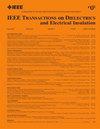Temperature Dependence of Self-Healing in BOPP Metallized Film Capacitors Under Rising Voltage
IF 3.1
3区 工程技术
Q2 ENGINEERING, ELECTRICAL & ELECTRONIC
IEEE Transactions on Dielectrics and Electrical Insulation
Pub Date : 2025-01-07
DOI:10.1109/TDEI.2025.3526749
引用次数: 0
Abstract
Self-healing (SH) plays as a unique property to benefit biaxially oriented polypropylene (BOPP) metallized film capacitors (MFCs) for high operation reliability in applications needing high volumetric energy property. However, massive heat could be accumulated inside BOPP MFCs upon long-term operation owing to the poor thermal conductivity of BOPP. The resulting temperature rise inside MFCs could bring seriously orientation to SHs considering the SHs a temperature-dependent progress. This study employs a mesoscopic and microscopic view to elucidate the temperature dependence of SHs with multiple Weibull subpopulation distributions aided by the examination of the morphology of demetallized area on BOPP layer after SH. As the couple of evidence, the variation of free volume and mean-square-displacement (MSD) of polypropylene (PP) with temperature are evaluated to illustrate the mechanism of temperature-dependent properties of SH. The findings reveal that moderate temperature increases can enhance SH inception voltage (SHIV), but excessively high temperatures have a detrimental effect. Furthermore, expected capacitor voltage (ECV) decreases with rising temperatures. The study also observes that both SHIV and ECV increase and then decrease with the voltage ramp rate, peaking at 300 V/s within the range of 50–900 V/s.升压下BOPP金属化薄膜电容器自愈的温度依赖性
自愈(SH)是双轴取向聚丙烯(BOPP)金属化薄膜电容器(mfc)的一种独特性能,在需要高体积能量性能的应用中具有很高的运行可靠性。然而,由于BOPP导热性差,长期运行后,BOPP mfc内部会积累大量热量。考虑到SHs是一个温度依赖的过程,由此导致的mfc内部温度升高可能会导致SHs的严重定向。本研究采用介观和微观视角,通过对高温后BOPP层脱金属区形貌的检测,阐明了高温对多个Weibull亚种群分布的温度依赖性。研究了聚丙烯(PP)的自由体积和均方位移(MSD)随温度的变化规律。结果表明,适度的温度升高可以提高SH起始电压(SHIV),但过高的温度对SH起始电压(SHIV)有不利影响。此外,预期电容器电压(ECV)随温度升高而降低。研究还发现,SHIV和ECV均随电压斜坡率先升高后降低,在50-900 V/s范围内,峰值为300 V/s。
本文章由计算机程序翻译,如有差异,请以英文原文为准。
求助全文
约1分钟内获得全文
求助全文
来源期刊
CiteScore
6.00
自引率
22.60%
发文量
309
审稿时长
5.2 months
期刊介绍:
Topics that are concerned with dielectric phenomena and measurements, with development and characterization of gaseous, vacuum, liquid and solid electrical insulating materials and systems; and with utilization of these materials in circuits and systems under condition of use.

 求助内容:
求助内容: 应助结果提醒方式:
应助结果提醒方式:


